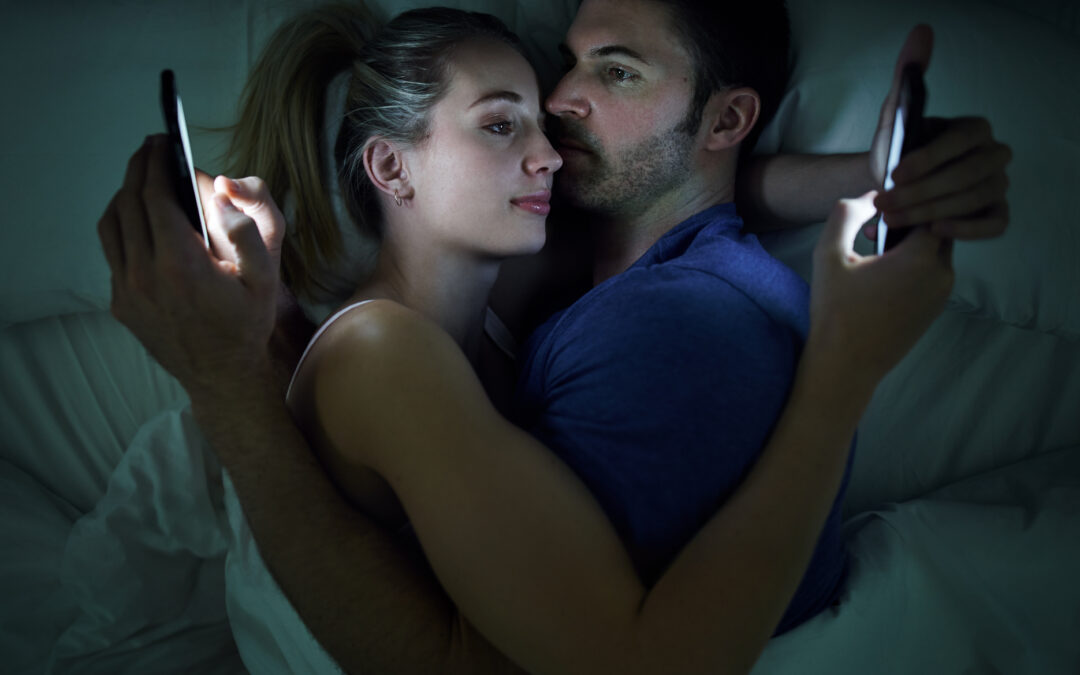Half of the population are addicted to ‘doomscrolling’ – but what is it?
Chances are you’ve done this before.
Words by Georgia Aspinall

Have you ever found yourself up late at night, reading endless reels of horrendous global news, unable to put your found down? Well, you’re just like half of the population then – and now it has a name: doomscrolling.
Doomscrolling is defined as the act of compulsively scrolling through negative news and social media feeds, even when it causes stress or anxiety. New research published by Social Science Research Network (SSRN) has found that over half of individuals acknowledge an addiction to scrolling, with British adults spending an average of three hours daily scrolling on their phones, and nearly one in five (19%) scrolling for over five hours.
‘I’m definitely addicted to doomscrolling,’ Sarah*, 27 from London told Grazia. ‘I’ll watch video after video about how terrible the world is and literally feel my anxiety rising in my body. My immediate reaction is to stop what I’m doing and find a way to relax, turning on the TV or cooking some food, and within minutes I’m back on my phone scrolling again. It’s second nature at this point, I barely notice I’m doing it until it’s been hours.’
@the.johnsonbrothers The doomscrolling wormhole 😵💫 #theboys #fyp #viral #interstellar ♬ original sound - The Johnson Brothers
According to the report, a significant portion exhibit ‘severely problematic’ news consumption linked directly to poorer mental health outcomes, including heightened stress and anxiety, while financial anxiety is also driving this behaviour, with a 2024 study finding over half of UK consumers are ‘obsessed’ with checking financial apps, a figure rising to 63% for Gen Z and 64% for Millennials.
‘Social media is hijacking human attention, and this new report proves it’s fuelling a mental health crisis,’ Sumita Hutchison, Director, NHS Foundation Trust Board
Said in response. ‘Services in the UK are stretched to breaking point and costing the government tens of millions each year.’
‘People are desperate for relief from the digital overload that’s eroding mental well-being,’ added Dr. Bala Subramaniam, mental health researcher and Professor of Anaesthesiology at Harvard Medical School. ‘This is a wake-up call for policymakers: we need systemic changes that prioritize human health over algorithm-driven engagement.’
According to the report, the constant immersion in negative content activates the body’s stress response and is linked to increased anxiety, fear, depression, poor sleep quality, and even a distorted perception of reality. Digital platforms, with algorithms designed to hold attention and often prioritising negative or emotionally charged content, create an environment where doomscrolling thrives then.
‘This is a wake-up call for policy makers.’
‘My roommates and I have started locking our phones away to combat this,’ Emily, 29 from Manchester says. ‘When we get home from work, we’ll have some time to chill and then we make a rule as soon as we start cooking the phones go in a locked draw and we’ll sit and talk or watch a film together. It’s genuinely made such a difference because it stops you idly reaching for your phone when you get a bit bored during a show or think about going on social media. If you want your phone, you have to get up and unlock the draw and face the music from the rest of us!’
But what’s the wider the solution? The research suggests that meditation practices are vital in combatting the rise of doomscrolling. Meditation can ‘strengthen emotional regulation, reduce stress, and counter the urge to compulsively consume negative information,’ it states.
In fact, when a free meditation app called Miracle of Mind launched, it was downloaded by one million people within 15 hours. The app offers simple seven-minute guided meditations, and its download popularity broke records set ChatGPT, Tik Tok, Facebook and Instagram.
‘The explosive success of “Miracle of Mind” sends a clear message—people are desperate for digital wellness solutions,’ Dr Shobha Puttaswamaiah, Consultant Child and Adolescent Psychiatrist, NHS Trust said. ‘But individual action alone isn’t enough. Governments must step up and implement policies that prioritize AI and social media usage to support mental health, rather than fuelling engagement-driven algorithms.
‘Social media platforms are optimized for maximum screen time, not well-being, and the result is an epidemic of stress, anxiety, and digital addiction—what many are now calling ‘brain rot.’ The mental health crisis is already here—if we don’t act now, we’re risking an entire generation,’ Dr Puttaswamaiah added.
Photo: Getty

